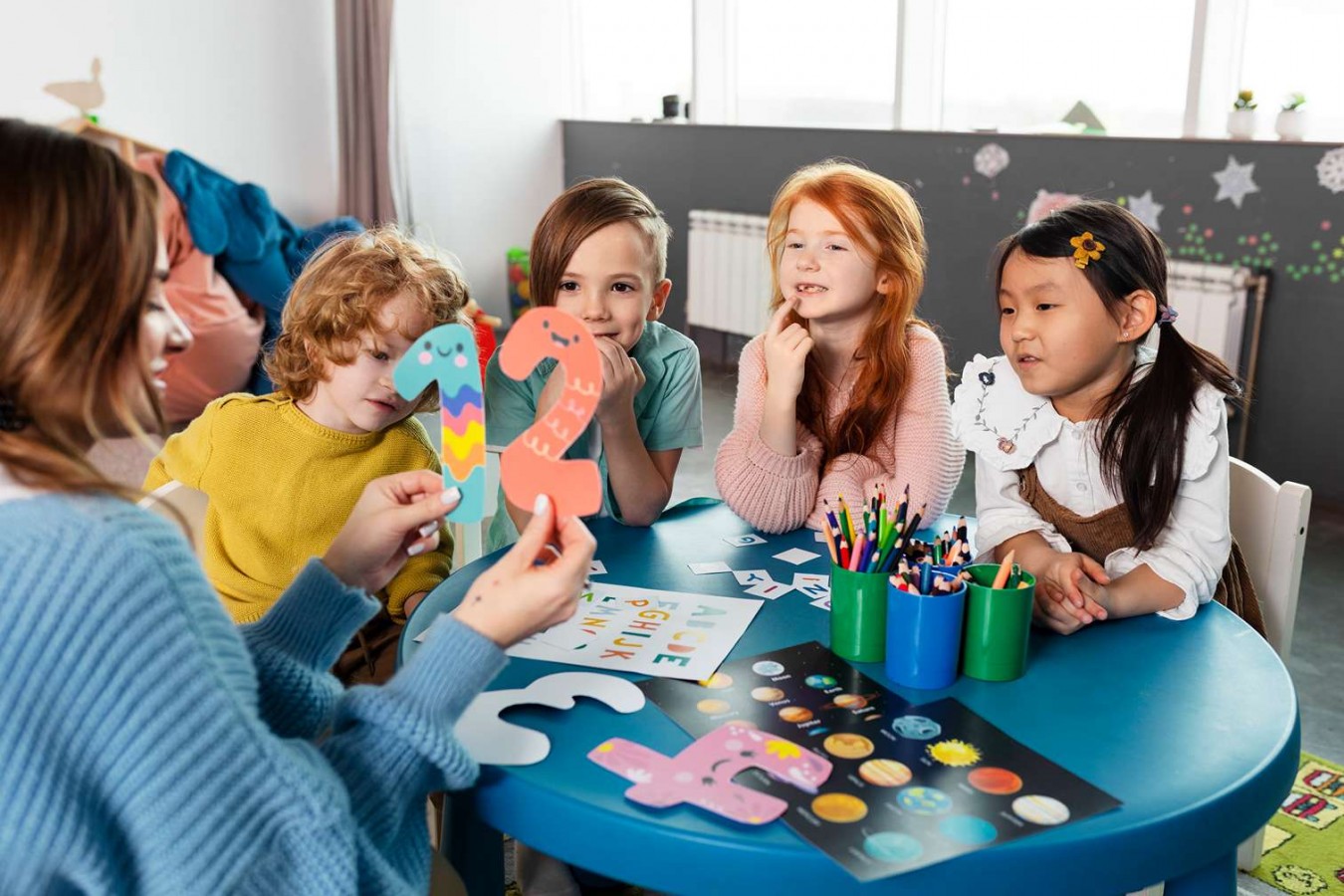What Is Play Based Learning? An Educational Approach For Your Children

Step into the vibrant landscape of education, where conventional practices are undergoing a transformative evolution. In this article, we'll delve into the definition of play-based learning, unraveling its purpose and elaborating how important it's.
What is Play Based Learning?
Play-based learning is an educational approach that centers around the use of play as a fundamental tool for fostering children's development and learning. It involves structured and purposeful play activities designed to promote cognitive, social, emotional, and physical growth in learners.
Instead of traditional formal instruction, play-based learning encourages exploration, creativity, and problem-solving in a more informal and interactive setting.
This approach recognizes the importance of hands-on experiences and self-directed discovery in the learning process, making education an engaging and enjoyable experience for students.
How Important is Play Based Learning
Play-based learning is important as it encapsulates a full approach to education, recognizing and harnessing the innate curiosity and creativity within children.
This dynamic methodology not only nurtures cognitive development by encouraging problem-solving and critical thinking but also cultivates essential social and emotional skills through interactive play. By seamlessly integrating physical activities, play-based learning contributes to motor skill development and overall physical well-being.
The Purpose of Play Based Learning
The purpose of play-based learning is to leverage the natural inclination of individuals, especially in early childhood, to engage in play as a powerful and effective educational tool.
This approach is designed to promote overall development by integrating cognitive, social, emotional, and physical aspects of learning within a playful context. The primary goals include fostering critical thinking, problem-solving skills, and creativity, while simultaneously nurturing essential social skills such as communication, cooperation, and emotional regulation.
Play-based learning aims to create an environment that is not only educational but also enjoyable, fostering intrinsic motivation and a positive attitude toward learning. By recognizing the inherent value of play, this approach acknowledges that meaningful learning occurs when individuals actively explore, experiment, and make connections in a hands-on and interactive manner, laying the groundwork for a lifelong love of learning.
Understanding the Key Elements of Play-Based Learning
Play-based learning is one of the most powerful ways young children learn and develop essential skills. But not all play leads to deep learning. To truly benefit from a play-based approach, teachers and parents need to include five key elements in children’s daily activities. Here’s a breakdown to help you picture how it works in practice.
1. Self-Chosen and Self-Directed
Children learn best when they get to make their own choices. In play-based learning, this means letting children decide what they want to play, how they want to play it, and for how long.
Instead of telling a child to play with the toy kitchen, you can say, “Here are the blocks, books, and dress-up clothes. What would you like to do today?” If they decide to line up blocks like a train, that’s great! The point is—they’re in charge.
Letting kids lead helps them feel confident and responsible for their own learning.
2. Enjoyable
If it’s not fun, it’s not play! Children are naturally curious and love to explore. For play-based learning to truly work, the experience has to be enjoyable and pressure-free. When kids enjoy what they’re doing, they’re more likely to stay engaged, ask questions, and think creatively.
3. Unstructured
Unstructured or “free play” is at the heart of play-based learning. This means no set instructions, no rules, and no expectations—just open-ended play.
Giving a child a box of random items like cloth pieces, buttons, and string without telling them what to make. One child might create a puppet, another a bracelet, and another may just sort them by color. All of these are valuable learning experiences. Unstructured play allows children to experiment, make mistakes, and figure things out on their own.
4. Process-Oriented
In play-based learning, the process matters more than the product. It’s not about what children create, but how they create it, what they discover, and how they express their ideas. This element encourages creativity, problem-solving, and resilience—skills that last a lifetime.
5. Imaginative
Imagination is where magic happens in childhood. Through pretend play, children explore different roles, situations, and emotions, helping them build empathy and social skills. Encouraging imaginative play also strengthens language development and emotional intelligence.
Parten’s 6 Stages of Play: How Children’s Play Evolves
Sociologist Mildred Parten observed how play changes as children grow. She discovered that from birth to around five years old, kids go through six stages of play. Understanding these stages can help adults support the right kind of play at the right time.
1. Unoccupied Play (Birth–3 months)
This is where it all begins! Babies may wave their arms, kick their legs, or stare at moving objects. It might not look like “play,” but it’s essential for sensory and motor development.
2. Solitary Play (3 months–2 years)
In this stage, children play alone, exploring toys or objects independently. They’re focused and not yet interested in playing with others.
3. Onlooker Play (2.5–3.5 years)
Children begin watching others play—like little scientists observing the world. They don’t join in, but they’re taking mental notes!
4. Parallel Play (18 months–2+ years)
Kids play side by side with others but don’t interact much. They might be building blocks next to each other, doing similar things independently.
5. Associative Play (Around 3–4 years)
Now, children begin interacting while playing. They might share toys, talk, or work in the same play area, though their goals may still be separate.
6. Cooperative Play (Around 4–5 years)
This is team play! Children play together toward a shared goal, like building a fort or playing “school” with assigned roles.
The Hidden Challenges of Play-Based Learning (And How to Tackle Them)
Play-based learning sounds amazing, right? Kids having fun, exploring their creativity, and learning naturally—it’s every parent and teacher’s dream! But the truth is, play-based learning isn’t always easy to implement. Like anything worthwhile, it comes with a set of challenges.
Let’s dive into some of the common obstacles, and what we can do to overcome them:
1. It Looks “Messy” and Unstructured
One of the biggest challenges is that play-based learning doesn’t always look like learning. There are no worksheets, no tests, no visible “results.” Sometimes it just looks like children are running around, making noise, or playing with random objects.
Remember to trust the process! Children are learning critical skills like problem-solving, language, and creativity. You can support this by documenting their play—take photos, write down their conversations, or create portfolios to track their growth over time.
2. Pressure from Academic Expectations
Many parents or schools worry that play-based learning won’t prepare children for reading, writing, or standardized tests. There’s a myth that more structured, academic instruction is always better.
Understand that play and academics aren’t opposites. Research shows that play-based learning builds the foundation for academic success by supporting language development, memory, and focus. Blend playful activities with pre-literacy and numeracy in fun ways—for example, counting blocks, storytelling games, or sorting by color.
3. Not Enough Time for Free Play
In many classrooms or homes, schedules are packed with structured lessons or extracurricular activities. That leaves little room for open-ended, self-directed play.
Make playtime a priority, not a filler. Even short periods of free play (20–30 minutes) can be powerful. Try creating a daily routine that protects time for imaginative, child-led play.
4. Lack of Resources or Space
Not all settings have access to large play areas, sensory materials, or a variety of toys. In some communities, space or budget limitations can make play-based learning more difficult to organize.
There’s a belief that you need expensive or fancy materials for play-based learning to work. Remember, children can turn almost anything into play! Cardboard boxes, fabric scraps, wooden spoons—simple materials can spark rich imagination. The key isn’t having more things, but offering open-ended materials and encouraging creativity.
5. Adult Misunderstanding or Lack of Training
Teachers or caregivers may not fully understand how to facilitate play-based learning. They might step in too often, give too many directions, or struggle with “letting go.”
6. Cultural Beliefs About Learning
In some cultures, play is seen as separate from learning, or even as a distraction. There may be expectations that children should sit quietly, memorize, and perform at an early age.
What Do Children Need to Succeed in Play-Based Learning? (And How Parents Can Help)
Play-based learning is a powerful way for children to explore, create, and grow. But just like anything else, children need certain skills and knowledge to get the most out of it.
Let’s explore what those are, and how you as a parent can support your child along the way.
1. Curiosity and a Willingness to Explore
Children need a natural sense of curiosity, try new things, and figure out how the world works. Play-based learning is fueled by exploration, imagination, and wonder.
How parents can help:
- Say “yes” to their questions and help them investigate answers.
- Give them safe opportunities to try new activities—like building with boxes, painting with their hands, or making up their own games.
- Encourage open-ended play like “What do you think will happen if…?”
2. Basic Social Skills
Play often means playing with others. To do that, children need basic social-emotional skills like:
- Taking turns
- Sharing materials
- Listening to others
- Expressing their needs calmly
These skills help children participate in pretend play, group games, and conversations during play.
How parents can help:
- Practice turn-taking during family games or meals.
- Use role play at home to act out common social scenarios (“What can we say if we want a toy someone else is using?”)
- Model kindness, patience, and good communication.
3. Imagination and Creativity
Play-based learning thrives when children can imagine stories, pretend to be characters, or invent games. This fuels language skills, problem-solving, and emotional expression.
How parents can help:
- Don’t rush to correct or “fix” their pretend play—join in!
- Offer open-ended materials like dress-up clothes, boxes, kitchen utensils, or nature items.
- Encourage storytelling and ask questions like “What happens next in your story?”
4. Language and Communication Skills
Even in early stages, play helps children practice words, make requests, ask questions, and describe what they’re doing. Language is a big part of play, especially in storytelling and role-play.
How parents can help:
- Narrate your child’s play: “I see you're building a big tower with blocks!”
- Ask open-ended questions like “What’s your plan?” or “Why did you choose that?”
- Read stories and encourage them to retell them during play.
5. Problem-Solving and Decision Making
Play-based learning gives children freedom—but that also means they need to make choices, try things out, and figure out what to do when something doesn’t work.
How parents can help:
- Let your child make small decisions: “Which game do you want to play?” or “How should we build this fort?”
- When challenges arise, don’t jump in right away—ask “What do you think we could try instead?”
- Celebrate effort over results.
6. Focus and Self-Regulation
Even in playful settings, children need to manage emotions, focus on tasks, and stay engaged—especially during group play or longer activities.
How parents can help:
- Set a consistent routine with time for free play.
- Teach calming strategies like deep breathing or counting to 10 when frustrated.
- Use timers to help them practice “focus time” before switching activities.
Example of Play Based Learning
An example of play-based learning could be a kindergarten class engaging in a thematic unit on dinosaurs.
Instead of a traditional lecture-style lesson, the teacher sets up a variety of play stations related to dinosaurs. At one station, children might dig for "fossils" in a sensory bin filled with sand. Another station could feature a dramatic play area where students pretend to be paleontologists discovering and examining dinosaur bones.
A creative station might involve arts and crafts, where children draw or construct their own dinosaurs. Throughout these activities, the children are not only having fun but also absorbing information about dinosaurs, their characteristics, and the concept of fossils.
This play-based approach seamlessly integrates educational content with interactive and enjoyable experiences, making the learning process both effective and engaging.
Several other activities of play-based learning:
- Building with blocks or LEGO
- Pretend play / role-playing
- Art and craft activities
- Sensory play (water, sand, slime, etc.)
- Alphabet and number games
- Cardboard box creations
- Puzzles and sorting games
- Small world play (toy animals, cars, etc.)
- Music and movement activities
Benefits of Play Based Learning
Play-based learning holds significant importance in the realm of education as it serves as a dynamic and effective approach to fostering holistic development in individuals, particularly in early childhood.
This methodology recognizes the innate inclination of learners to engage in play and leverages it as a powerful tool for learning and growth. Here’s the benefits of play based learning :
1. Cognitive Development
Play-based learning stimulates cognitive functions such as problem-solving, critical thinking, and creativity. It allows learners to explore, experiment, and make connections between ideas in a hands-on manner.
2. Social and Emotional Skills
Through playing, children develop crucial social skills such as communication, cooperation, and negotiation. It also provides a platform for emotional expression, helping children understand and manage their feelings.
3. Physical Development
Play-based activities often involve movement and physical interaction, contributing to the development of motor skills, coordination, and spatial awareness.
4. Motivation and Engagement
Play is inherently enjoyable, fostering a positive attitude towards learning. It promotes motivation, as they will be naturally inclined to participate and learn through activities that captivate their interest.
5. Imagination and Creativity
Play based learning encourages the use of imagination and creativity, allowing children to explore different roles, scenarios, and possibilities. This not only enhances creativity but also nurtures a sense of curiosity and wonder.
6. Adaptability and Problem-Solving
Play-based learning presents challenges and situations that require them to adapt and find solutions. This cultivates resilience, flexibility, and effective problem-solving skills.
7. Cultural and Language Development
Playing while learning also provides a context for language development as children will engage in conversations, negotiate rules, and express themselves verbally. It also allows for the exploration of cultural concepts and norms.
8. Long-Term Positive Attitude Towards Learning
By making the learning process enjoyable, play-based learning helps instill a positive attitude towards education, laying a foundation for a lifelong love of learning.
Interested in Play Based Learning?
Play-based learning has become an intriguing early childhood program. Engaging in play-based learning is a fascinating approach in early childhood education. The play method subtly allows children to perceive learning as a natural and enjoyable experience.
Finding schools that prioritize play-based learning is an effortless task. Rockstar Academy offers a preschool program centered around play-based education.
Rockstar Academy is Indonesia’s One-Stop Physical Education Center that offers comprehensive early childhood education and Sports & Performing Arts Academy for children from 6 months to 18 years of age. Don’t worry and just contact Rockstar Academy for the best version of your children’s future!
FAQ
1. What is Play-Based Learning?
Play-Based Learning is an educational approach that utilizes play as a central method for teaching and fostering child development. It encourages exploration, creativity, and problem-solving through various play activities.
2. Why is Play-Based Learning Important?
Play-Based Learning is essential as it promotes holistic development, including cognitive, social, emotional, and physical aspects. It allows children to learn in a natural, enjoyable way, fostering a love for learning.
3. At what age is Play-Based Learning most effective?
Play-Based Learning is beneficial for children of various ages, but it is particularly effective in early childhood, from infancy to around six years old. During this period, children are naturally inclined to learn through play.
4. How does Play-Based Learning support cognitive development?
Play-Based Learning enhances cognitive development by stimulating problem-solving skills, critical thinking, and imagination. It provides hands-on experiences that contribute to a child's understanding of the world around them.



